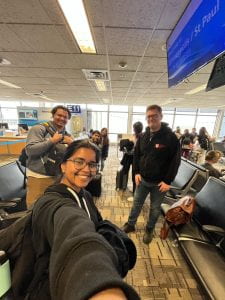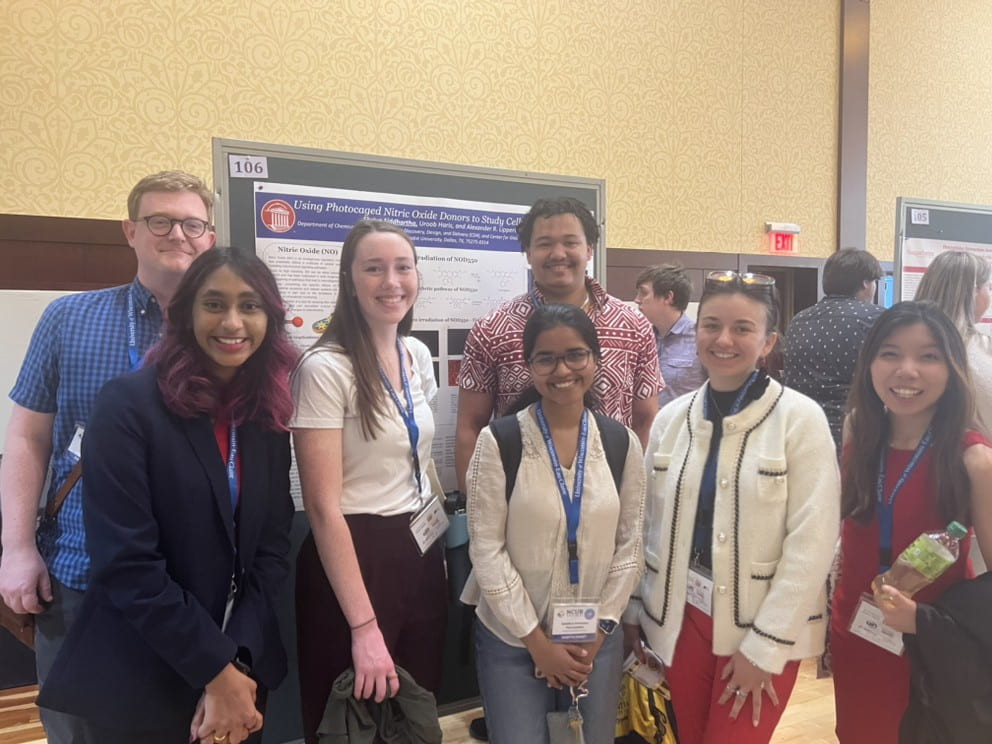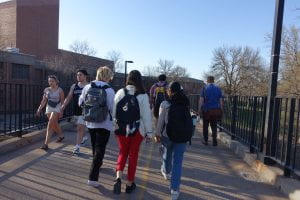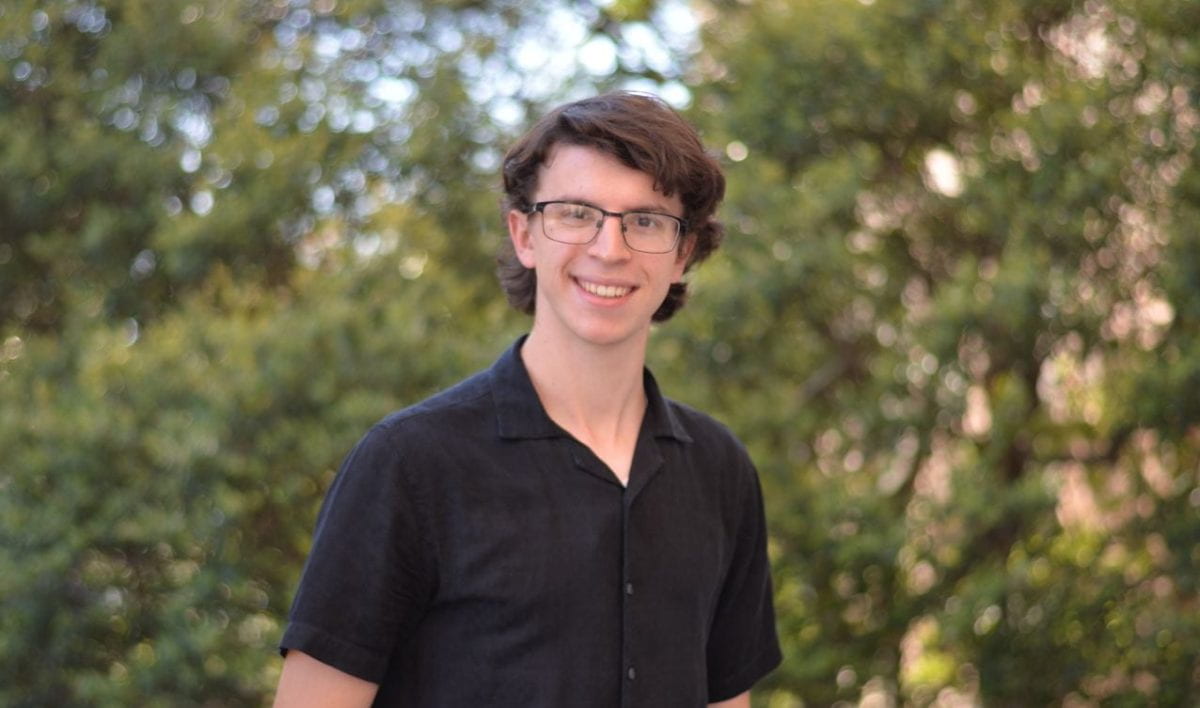I had the pleasure of taking eight students to present their research and creative work at the National Conference for Undergraduate Research 2023. We traveled to the University of Wisconsin-Eau Claire, where we joined about 3500 students, faculty, and staff (along with UWEC’s 1000 volunteers!) for an exciting conference.
I asked our students for their thoughts on the experience:
The NCUR experience

Shriya Siddhartha ’26: Attending NCUR was a wonderful opportunity and the experience of a lifetime. It was such a pleasure to present the results of my research to a wider audience. I enjoyed connecting with student researchers from around the world and learning about the incredible work being conducted at their respective institutes.
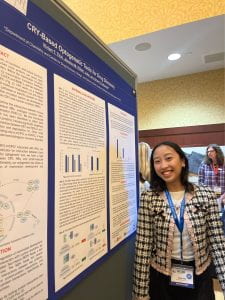
Vivian Thai ’25: NCUR was an incredible opportunity to network with undergraduates and professors and I’m so glad I attended NCUR for my first poster presentation. My favorite aspect was connecting with other passionate students and observing the most talented presentations I have ever seen.
Regina Nguyen ’24: When my abstract was accepted to NCUR 2023, I knew I had been given the opportunity to present the project that made me passionate about research. Indeed, I was able to share my work in a low-pressure, supportive environment.
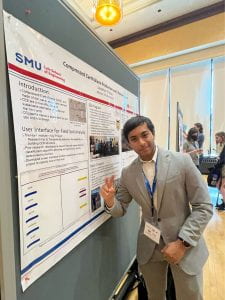
Jonathan Thomas ’25: NCUR was such an enriching experience for me as an undergraduate researcher. Not only did I get the chance to meet with exceptional researchers from a variety of disciplines from different parts of the globe, but I also got a glimpse into the future of my own field (Civil Engineering) through the groundbreaking work being presented.
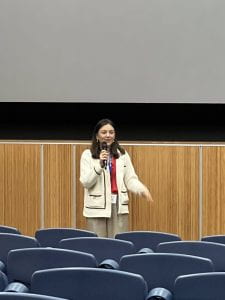
Alexandra Savu ’23: What I loved the most about NCUR is the environment I got immersed in: being surrounded by ambitious people of my age in whose you can see a burning passion for the topics they are presenting and have researched on brought me more joy and thirst for life.
Making connections
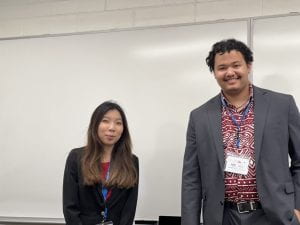
Odran Fitzgerald ’24: My favorite part about going out to NCUR was meeting different people from around the country that had similar interests as my specific research but approached similar problems from different angles. It was really nice also to see environmental research, and people who were passionate about environmental research in other areas than environmental science and environmental engineering such as social science and biology.
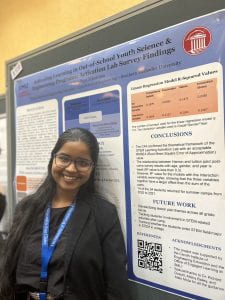
Sandhya Srinivasa ’23: One of my favorite aspects of NCUR is learning about other individuals’ unique research areas and being able to share mine with them. In particular, in the poster sessions, you can create that 1-to-1 connection with the presenter and learn not only about their topic but about them as well. NCUR is a great first conference to go to because it fosters a community where everyone listens out of curiosity and genuinely wants to uplift each other!
Alexandra: I loved meeting people who care about the details of their work, and who also cared about other people’s projects. I felt heard and important during my presentation as I felt that everyone in the room had a good reason to be there: to fully engage in the movie in front of them. And I am sure all other presenters felt the same.

Jonathan: One of my favorite projects was from a researcher from the American University in Cairo, who was looking into pavements that could generate electricity through the kinetic energy of people walking on it. Talking with her over how she got into research and her research methodology gave me insight into how other engineers performed research and gave me a chance to “nerd out” with someone who was also deeply interested in novel construction methods.
Regina: I didn’t expect that I would make so many fast friendships formed from mutual excitement for each other’s work regardless of discipline and how rich those would make my experience in Eau Claire. Undeniably. my NCUR connections have made me more excited for a research career and I couldn’t recommend it more.
Any advice for future NCUR presenters?
 Vivian: For other undergraduates attending their first conference, I would give the advice to work hard and prepare accordingly, but don’t stress out too much about it. Everyone at the conference is there to learn more about your work and you’re going to have so much fun.
Vivian: For other undergraduates attending their first conference, I would give the advice to work hard and prepare accordingly, but don’t stress out too much about it. Everyone at the conference is there to learn more about your work and you’re going to have so much fun.
Alexandra: Some advice I would give to new presenters is to have a clear schedule of what presentations they want to attend and to let themselves speak freely during their big moment, without too much “mirror readings”.
Jonathan: My biggest piece of advice to researchers who are planning to go to a large conference like NCUR is that they should try and connect with as many people as possible. It’s such a rare occurrence to be in a room with so many of the brightest undergrads in the world, and it would be a shame to leave without really getting to know anyone. Your network is your net worth as they say, and that’s no different in research.
